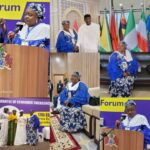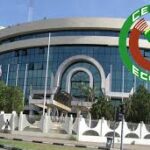Debunking Misinformation: How Policy Decisions Are Made in ECOWAS
By Raymond Enoch
In recent times, misinformation about the decision-making process of the Economic Community of West African States (ECOWAS) has been spreading, leading to misconceptions about how policies are formulated and implemented.

Paradigm News takes a look at this claims and presents the following in order to educate and enlighten the generality of the citizens across the region, the global community, researchers students and young people who are interested in governance and activities of Economic Community of West African States.
Contrary to claims that ECOWAS policies are dictated by external forces or individuals acting unilaterally, the regional body follows a structured governance process that ensures decisions are made collectively by member states through legally established institutions.
Understanding how ECOWAS makes its decisions is crucial for fostering informed discussions and countering false narratives. Here is a breakdown of how policies and resolutions are formulated and implemented within ECOWAS.
The Institutional Process Behind ECOWAS
Decision-Making
The decision-making process in ECOWAS involves several key institutions, each playing a crucial role in policy formulation, adoption, and enforcement. These institutions ensure that regional policies align with the interests of all 15 member states.
The Authority of Heads of State and Government
The highest decision-making body in ECOWAS, the Authority of Heads of State and Government, comprises the presidents and heads of government of all member states.
This body makes major political, economic, and security decisions for the region.
Decisions are made by consensus or majority voting, depending on the issue at hand.
The Authority ensures that policies reflect the collective will of ECOWAS nations.
. The Council of Ministers
This body consists of ministers—typically of foreign affairs, finance, or regional integration—from each member state.
Reviews and recommends policies, regulations, and budgets before forwarding them to the Heads of State for approval.
Plays a critical role in policy implementation by ensuring that ECOWAS decisions are enforced at the national level.
The ECOWAS Commission
The Commission serves as the executive arm of ECOWAS, overseeing the day-to-day administration of the community’s programs and policies.
Led by the President of the ECOWAS Commission, who is appointed by the Authority of Heads of State.
Implements policies, treaties, and agreements ratified by ECOWAS leaders.
Works closely with technical departments, expert committees, and regional institutions to develop and execute strategic policies.
The ECOWAS Parliament
As a body representing the people of West Africa, the ECOWAS Parliament plays a vital role in ensuring that policy decisions reflect the interests of citizens.
Provides democratic oversight by debating and offering advisory opinions on regional matters.
Strengthens participatory governance and ensures that policies address the concerns of West African citizens.
The ECOWAS Court of Justice
This judicial body guarantees that ECOWAS laws and decisions are upheld.
Ensures legal oversight and compliance with ECOWAS regulations.
Interprets and rules on disputes concerning ECOWAS treaties and protocols.
Protects the rights of individuals and member states under ECOWAS laws.
Key Takeaways: Setting the Record Straight
To combat misinformation, it is important to understand these key facts about ECOWAS decision-making:
No single individual or external actor dictates ECOWAS policies. Decisions are made collectively by member states through established institutions.
Policies are based on legal frameworks and regional agreements, not external pressure or unilateral decisions.
ECOWAS policies promote regional peace, economic development, security, and integration in line with the community’s founding treaties and protocols.
Implementation of ECOWAS decisions requires collaboration between the regional body and national governments.
The Need for Informed Discourse
As ECOWAS continues to play a central role in shaping West Africa’s political and economic landscape, it is crucial that public discourse on its policies remains factual and well-informed. Misinformation can undermine regional unity and cooperation, while informed engagement can help strengthen democratic governance and economic progress in West Africa.
By understanding how ECOWAS operates, we can foster transparency, accountability, and trust in the regional body’s policies and decisions. Let’s work together to promote accuracy and reject misinformation about ECOWAS governance.










